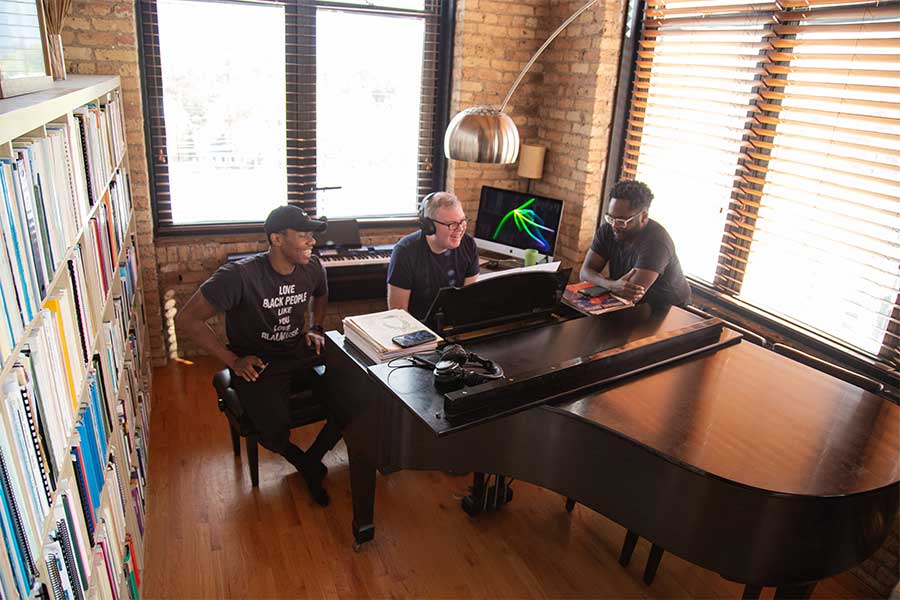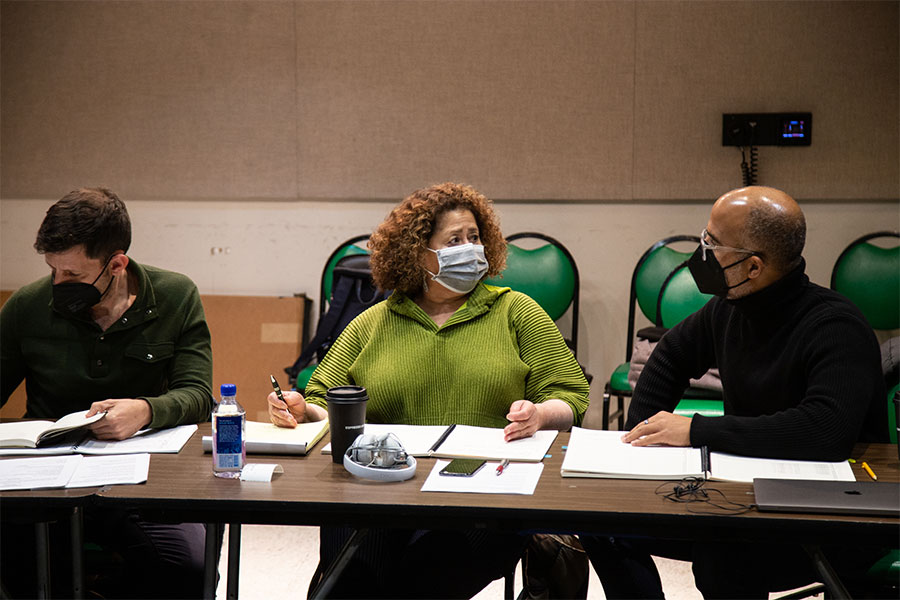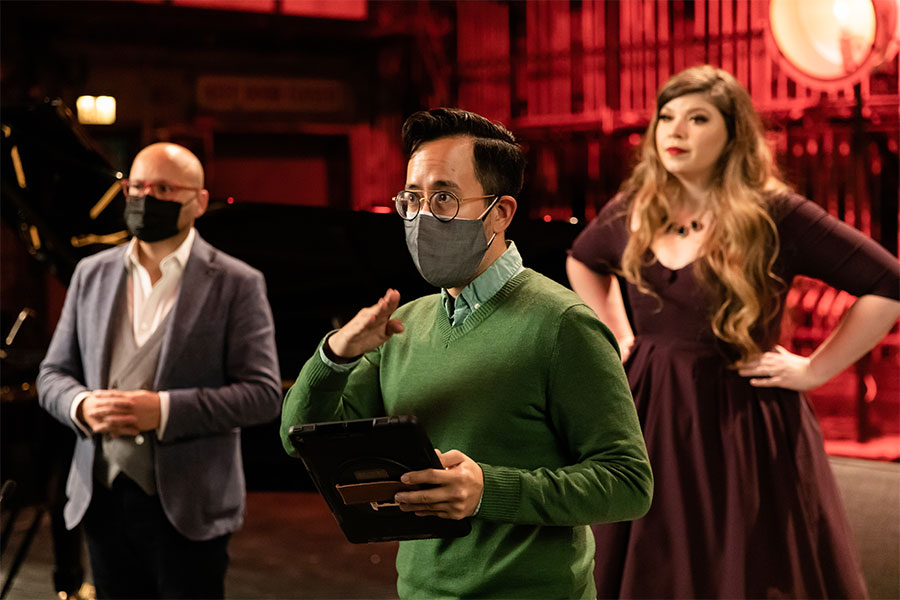December 15, 2022
Matthew Ozawa talks new opera at Lyric
In April 2022, Matthew Ozawa became Lyric’s first Chief Artistic Administration officer. Having previously served as Interim Head of Lyric Unlimited — Lyric’s creative engagement and education division — as well as Director and Associate Director on a number of productions, Matthew is uniquely qualified to help Lyric build a vibrant future, advancing our art onstage as well as broadening our audience.
Working closely with General Director and CEO Anthony Freud and Music Director Enrique Mazzola, Matthew is part of the team that decides what audiences will see onstage in future seasons.
Season planning is a never-ending balancing act between what we’re currently producing and what we hope to bring to the stage in the next five to ten years. We strive to present a mix of beloved classics, lesser-known gems, and important new works to Chicago audiences. This season, Lyric will bring to life two world premiere operas — a feat that has never been done in the organization’s 68-year history. We spoke to Matthew to see what new works mean for the future of opera and to get a glimpse of the process that starts long before a production hits the stage.
Q & A
Matthew, thank you for joining us for this conversation on new works! Can you start out by speaking about “why new works,” particularly why focus on bringing them to the stage at Lyric Opera?
It’s our civic responsibility and mission at Lyric to connect to audiences and community by redefining the landscape of opera to—help evolve the art form, and pushing boundaries on what is possible in opera. By speaking directly to our present lived experiences and witnessing new perspectives through stories in musical form, I believe we reach an even broader array of people, speaking to so many stories that haven’t been seen on an opera stage.
When finding new artists to create world premieres, we ask ourselves several questions: Whose story is being told? Who gets to tell that story and how do they tell it? Who is it for?
There are two world premieres this coming season, The Factotum and Proximity, which address themes connected to Chicago, in particular, and issues proximal to our everyday life. They also represent Lyric’s development of the American opera genre and a multi-year commitment to producing new and recent work over the next several years.

Co-creators of The Factotum, Will Liverman and DJ King Rico, alongside Ryan Opera Center Music Director, Craig Terry, preparing for the workshop hosted at Lyric in 2021.
Can you tell us a little bit about this season’s world premieres, The Factotum and Proximity?
The Factotum is being created by Ryan Opera Center Alumnus, Will Liverman, and DJ recording artist, DJ King Rico. Inspired in part by The Barber of Seville, the opera blends hip-hop, barbershop, gospel, funk, neo-soul, and R&B music styles to propel the action. Will Liverman actually describes it as a soul opera. The stage director and dramaturg, Rajendra Ramoon Maharaj, has emphasized the work as a celebration of Black joy designed to uplift the Black community.
Proximity brings together a complement of some of the most creative minds of our time, including winners of the Pulitzer Prize and Grammy Awards. This world premiere opera is created by fusing three entirely different works together, exploring the themes of yearning for connection in a world driven by technology, the devastating impact of gun violence on cities and neighborhoods, and the need to respect and protect our natural resources. MacArthur "Genius" Grant winner Yuval Sharon makes his mainstage directorial debut here, bringing to life a riveting and inspiring new American opera. Just looking at the names of people who are involved in these projects, we see Lyric is dedicated to supporting high-caliber artists whose level of collaboration is itself very special and critical to Lyric’s mission of supporting new works.
He last worked with Lyric on Twilight: Gods, during the 2020/21 season. The reimagining of the final chapter of Wagner's epic Ring cycle set in the largest underground parking complex in the country was a stunning return to live performance at Lyric.
Both works are groundbreaking in what they say for the future of our art form and are exciting pieces that demonstrate Lyric’s deep commitment to advancing our art and our artists in service to our ever-broadening audiences.
What are some of the challenges of creating and producing new operas?
One of the challenges with new work is that no one hears it fully or sees it fully produced until the very end. So there are many phases where it goes through gestation periods and evolutions, and is edited and crafted. Artists are delving into the characters and delving into how the music displays the intentions of those characters. It is a very sensitive space to create art in. It also means there are usually a lot of changes that occur over time.
As much as artists are creating, and as they create, we at Lyric will dialogue and ricochet back and forth with them, because we also have strategic goals around these pieces, and hopes for how they’re going to reach our audiences. Within that fabric, we must still give artists the ability to express–to feel safe in that mode of creative art making. And all while still supporting them, and giving deadlines and structure.

Director Yuval Sharon, Librettist Anna Deavere Smith and Composer Daniel Bernard Roumain workshop The Walkers, one of the three operas featured in this season’s Proximity.
As you engage these artists to compose new works, what does the timeline from that initial meeting to the actual production look like?
They come to Anthony [Freud] and to the team in any number of ways. Sometimes it's actually viewing their work in other mediums, sometimes it’s viewing their work through other artists, and sometimes it’s seeing someone who has so much potential, charting their career path over time, and deciding it’s time to engage them to compose an opera. Once we start to have dialogue and conversations with them, then it’s a lengthy road to discuss what stories they’re passionate about, what other artists they’re interested in working with, and looking at the timeline they need in writing an opera. The bedrock of what we provide to support them in development goes through three to four big phases and those phases can last anywhere from 2 to 3 years.
It’s about the art and the artist, and curating and supporting that experience. I do believe that the curation and support of artists always translates to the art. So I’m excited to see how that plays out over the next couple of months. It’s also daunting that we’re presenting two world premieres back to back. The last time we did a world premiere was Bel Canto during the 2015/16 Season.

Matthew Ozawa directs members of the 2020/21 Ryan Opera Ensemble in the Sole e Amore virtual recital.
Thank you so much, Matthew, for giving us some insight into new works and what that looks like here at Lyric. Before we wrap up, can you tell us: What does success for new opera look like to you and to Lyric?
I usually question what is success versus what is not because even if something doesn’t feel successful, it’s always a learning opportunity for everybody, whether that’s audiences or the company, about the next phase of art making. These artists will naturally learn a lot and continue to craft the work over the course of many years.
World premieres, new work, and all opera experiences are a symbiotic relationship between the art and artist and the audience. So success has two components. On the artistic front, it’s that we’re seeing the highest level of artistry made by artists who are enabled to tell those stories in their own unique, artistic way. Fostering and curating that, seeing it come to fruition and seeing the artist feel fulfilled in that experience is a marker of success. Another marker of success for the art is how that translates to the work’s future. Do other companies pick it up? We already know The Factotum is headed to other opera houses with our co-producers and co-commissioners, so it has a huge life. We’re seeing the seeds of success for these artists because they’re hoping for, and we are hoping for, the longest life possible.
The other element of success is that it has a true impact on our audiences, so that we not only see diversification of who is coming to the opera house and increasing the numbers of people coming but also that their experience is one where they are transformed and awakened to the power of opera. I think there’s something about going to the opera house and being surprised–not knowing what you’re going to find. If audiences can come, be engaged and surprised, walk away and talk about this piece and remember this piece for years to come, that is a huge marker of success.
Interested in making a contribution to foster the work of our artists? By making a gift by the end of the year, you can help shape the future of opera while enhancing your own Lyric experience.
